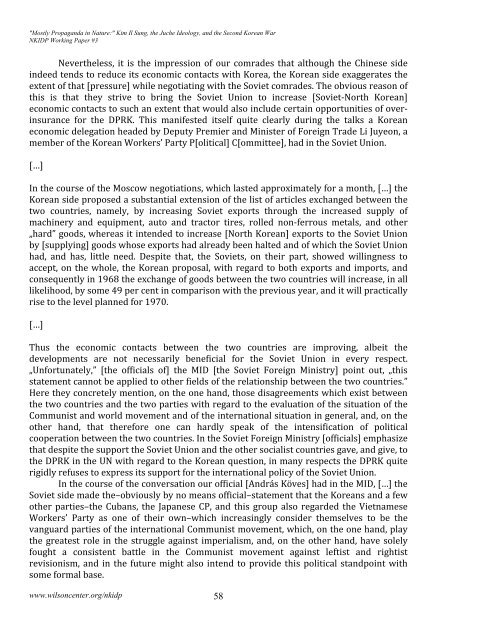"Mostly Propaganda in Nature:" Kim Il Sung, the Juche Ideology, and ...
"Mostly Propaganda in Nature:" Kim Il Sung, the Juche Ideology, and ...
"Mostly Propaganda in Nature:" Kim Il Sung, the Juche Ideology, and ...
You also want an ePaper? Increase the reach of your titles
YUMPU automatically turns print PDFs into web optimized ePapers that Google loves.
"<strong>Mostly</strong> <strong>Propag<strong>and</strong>a</strong> <strong>in</strong> <strong>Nature</strong>:" <strong>Kim</strong> <strong>Il</strong> <strong>Sung</strong>, <strong>the</strong> <strong>Juche</strong> <strong>Ideology</strong>, <strong>and</strong> <strong>the</strong> Second Korean War<br />
NKIDP Work<strong>in</strong>g Paper #3<br />
Never<strong>the</strong>less, it is <strong>the</strong> impression of our comrades that although <strong>the</strong> Ch<strong>in</strong>ese side<br />
<strong>in</strong>deed tends to reduce its economic contacts with Korea, <strong>the</strong> Korean side exaggerates <strong>the</strong><br />
extent of that [pressure] while negotiat<strong>in</strong>g with <strong>the</strong> Soviet comrades. The obvious reason of<br />
this is that <strong>the</strong>y strive to br<strong>in</strong>g <strong>the</strong> Soviet Union to <strong>in</strong>crease [Soviet‐North Korean]<br />
economic contacts to such an extent that would also <strong>in</strong>clude certa<strong>in</strong> opportunities of over‐<br />
<strong>in</strong>surance for <strong>the</strong> DPRK. This manifested itself quite clearly dur<strong>in</strong>g <strong>the</strong> talks a Korean<br />
economic<br />
delegation headed by Deputy Premier <strong>and</strong> M<strong>in</strong>ister of Foreign Trade Li Juyeon, a<br />
member<br />
of <strong>the</strong> Korean Workers’ Party P[olitical] C[ommittee], had <strong>in</strong> <strong>the</strong> Soviet Union.<br />
[…]<br />
In <strong>the</strong> course of <strong>the</strong> Moscow negotiations, which lasted approximately for a month, […] <strong>the</strong><br />
Korean side proposed a substantial extension of <strong>the</strong> list of articles exchanged between <strong>the</strong><br />
two countries, namely, by <strong>in</strong>creas<strong>in</strong>g Soviet exports through <strong>the</strong> <strong>in</strong>creased supply of<br />
mach<strong>in</strong>ery <strong>and</strong> equipment, auto <strong>and</strong> tractor tires, rolled non‐ferrous metals, <strong>and</strong> o<strong>the</strong>r<br />
„hard” goods, whereas it <strong>in</strong>tended to <strong>in</strong>crease [North Korean] exports to <strong>the</strong> Soviet Union<br />
by [supply<strong>in</strong>g] goods whose exports had already been halted <strong>and</strong> of which <strong>the</strong> Soviet Union<br />
had, <strong>and</strong> has, little need. Despite that, <strong>the</strong> Soviets, on <strong>the</strong>ir part, showed will<strong>in</strong>gness to<br />
accept, on <strong>the</strong> whole, <strong>the</strong> Korean proposal, with regard to both exports <strong>and</strong> imports, <strong>and</strong><br />
consequently <strong>in</strong> 1968 <strong>the</strong> exchange of goods between <strong>the</strong> two countries will <strong>in</strong>crease, <strong>in</strong> all<br />
likelihood,<br />
by some 49 per cent <strong>in</strong> comparison with <strong>the</strong> previous year, <strong>and</strong> it will practically<br />
rise to <strong>the</strong> level planned for 1970.<br />
[…]<br />
Thus <strong>the</strong> economic contacts between <strong>the</strong> two countries are improv<strong>in</strong>g, albeit <strong>the</strong><br />
developments are not necessarily beneficial for <strong>the</strong> Soviet Union <strong>in</strong> every respect.<br />
„Unfortunately,” [<strong>the</strong> officials of] <strong>the</strong> MID [<strong>the</strong> Soviet Foreign M<strong>in</strong>istry] po<strong>in</strong>t out, „this<br />
statement cannot be applied to o<strong>the</strong>r fields of <strong>the</strong> relationship between <strong>the</strong> two countries.”<br />
Here <strong>the</strong>y concretely mention, on <strong>the</strong> one h<strong>and</strong>, those disagreements which exist between<br />
<strong>the</strong> two countries <strong>and</strong> <strong>the</strong> two parties with regard to <strong>the</strong> evaluation of <strong>the</strong> situation of <strong>the</strong><br />
Communist <strong>and</strong> world movement <strong>and</strong> of <strong>the</strong> <strong>in</strong>ternational situation <strong>in</strong> general, <strong>and</strong>, on <strong>the</strong><br />
o<strong>the</strong>r h<strong>and</strong>, that <strong>the</strong>refore one can hardly speak of <strong>the</strong> <strong>in</strong>tensification of political<br />
cooperation between <strong>the</strong> two countries. In <strong>the</strong> Soviet Foreign M<strong>in</strong>istry [officials] emphasize<br />
that despite <strong>the</strong> support <strong>the</strong> Soviet Union <strong>and</strong> <strong>the</strong> o<strong>the</strong>r socialist countries gave, <strong>and</strong> give, to<br />
<strong>the</strong> DPRK<br />
<strong>in</strong> <strong>the</strong> UN with regard to <strong>the</strong> Korean question, <strong>in</strong> many respects <strong>the</strong> DPRK quite<br />
rigidly refuses to express its support for <strong>the</strong> <strong>in</strong>ternational policy of <strong>the</strong> Soviet Union.<br />
In <strong>the</strong> course of <strong>the</strong> conversation our official [András Köves] had <strong>in</strong> <strong>the</strong> MID, […] <strong>the</strong><br />
Soviet side made <strong>the</strong>–obviously by no means official–statement that <strong>the</strong> Koreans <strong>and</strong> a few<br />
o<strong>the</strong>r parties–<strong>the</strong> Cubans, <strong>the</strong> Japanese CP, <strong>and</strong> this group also regarded <strong>the</strong> Vietnamese<br />
Workers’ Party as one of <strong>the</strong>ir own–which <strong>in</strong>creas<strong>in</strong>gly consider <strong>the</strong>mselves to be <strong>the</strong><br />
vanguard parties of <strong>the</strong> <strong>in</strong>ternational Communist movement, which, on <strong>the</strong> one h<strong>and</strong>, play<br />
<strong>the</strong> greatest role <strong>in</strong> <strong>the</strong> struggle aga<strong>in</strong>st imperialism, <strong>and</strong>, on <strong>the</strong> o<strong>the</strong>r h<strong>and</strong>, have solely<br />
fought a consistent battle <strong>in</strong> <strong>the</strong> Communist movement aga<strong>in</strong>st leftist <strong>and</strong> rightist<br />
revisionism, <strong>and</strong> <strong>in</strong> <strong>the</strong> future might also <strong>in</strong>tend to provide this political st<strong>and</strong>po<strong>in</strong>t with<br />
some formal base.<br />
www.wilsoncenter.org/nkidp<br />
58

















